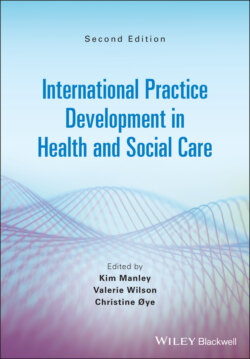Читать книгу International Practice Development in Health and Social Care - Группа авторов - Страница 35
Conclusion
ОглавлениеTrue collaboration between professional providers and service users can be seen as a paradigm shift. In the examples, the providers were facilitators as well as learners, and the service users were both providers and participants. Fundamental issues from PD, such as the use of creative approaches and principles of collaboration, inclusion and participation, can support the services in moving towards more collaborative practices. PD’s emphasis on facilitation as a skill to be developed and something that requires reflection is also very helpful in expanding the understanding of the role of healthcare workers in person‐centred services.
When professionals work alongside consumers in partnership, there is learning and sharing of knowledge between health professional and consumer, between consumer and consumer, and between health professional and health professional. Within the ostomy information group this collaborative approach evolved to offer STNs a vehicle to empower patients to build a solid knowledge base which can help them become more self‐sufficient in managing their life with a stoma.
From the STN perspective, the group members also provide support to their role through supporting each other, being involved in nurse education and fundraising for the ostomy association. Such efforts contribute to nurse scholarships aiming to train more STNs.
The recovery courses change the perspective by being educationally informed rather than therapeutically informed (Perkins et al. 2012, p. 3). The processes of co‐production and co‐facilitation by those with professional and lived experience, together with the creation of a supportive but challenging culture and environment, provide participants with opportunities for involvement. And maybe even more importantly, with opportunities to be someone that makes a difference. The professionals and persons with lived experience learn together and also share in the privilege of caring for others.
Professionals alone cannot define an illness, know what good treatment is or what the best solution to a person’s challenges in everyday life are. The person‐centred care movement has opened our eyes to the question: ‘What ought to be the starting point when providing services – the health system’s prescriptions or each individual patient’s needs?’ The extent of the benefits for patients and service users in taking part in collaborative approaches to health service (as illustrated in this chapter) promotes a further question: ‘Do societies that support people to live empowered lives ultimately need fewer health services?’ This question has yet to be answered scientifically but is surely now on the knowledge agenda as we move forward. Sharing the privilege of being of help to other people is satisfying for professionals, and democratisation can and does work for people and service users too.
